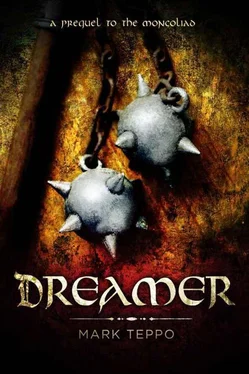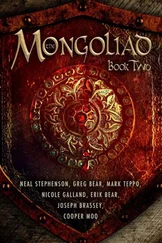Mark Teppo - Dreamer - A Prequel to the Mongoliad
Здесь есть возможность читать онлайн «Mark Teppo - Dreamer - A Prequel to the Mongoliad» весь текст электронной книги совершенно бесплатно (целиком полную версию без сокращений). В некоторых случаях можно слушать аудио, скачать через торрент в формате fb2 и присутствует краткое содержание. Жанр: Альтернативная история, на английском языке. Описание произведения, (предисловие) а так же отзывы посетителей доступны на портале библиотеки ЛибКат.
- Название:Dreamer: A Prequel to the Mongoliad
- Автор:
- Жанр:
- Год:неизвестен
- ISBN:нет данных
- Рейтинг книги:5 / 5. Голосов: 1
-
Избранное:Добавить в избранное
- Отзывы:
-
Ваша оценка:
- 100
- 1
- 2
- 3
- 4
- 5
Dreamer: A Prequel to the Mongoliad: краткое содержание, описание и аннотация
Предлагаем к чтению аннотацию, описание, краткое содержание или предисловие (зависит от того, что написал сам автор книги «Dreamer: A Prequel to the Mongoliad»). Если вы не нашли необходимую информацию о книге — напишите в комментариях, мы постараемся отыскать её.
Dreamer: A Prequel to the Mongoliad — читать онлайн бесплатно полную книгу (весь текст) целиком
Ниже представлен текст книги, разбитый по страницам. Система сохранения места последней прочитанной страницы, позволяет с удобством читать онлайн бесплатно книгу «Dreamer: A Prequel to the Mongoliad», без необходимости каждый раз заново искать на чём Вы остановились. Поставьте закладку, и сможете в любой момент перейти на страницу, на которой закончили чтение.
Интервал:
Закладка:
Mark Teppo
Dreamer: A Prequel to the Mongoliad
VERNA, 1224
The oratory and two other buildings of the hermitage were built along a ridge of mottled rock near the peak of La Verna. The upthrust of smooth basalt served as the back wall for one of the two dormitories. A small garden was delineated by a hedge of jumbled stones, a makeshift barrier that mainly served to keep the capricious wind from stealing the soil. Several goats and chickens wandered aimlessly about the grounds — the goats, with their thick coats, were not terribly disturbed by the wind that blew through the rocky terrain of the mountaintop.
The hermitage was home to a half dozen lay brothers of the Ordo Fratrum Minorum — Fraticelli, as they referred to themselves. The mountain had been a gift from the Count of Chiusi, who had, some years prior, been witness to one of the spontaneous sermons offered by the titular head of the order, Francis of Assisi. So impressed by Francis’s rhetoric, he had bequeathed the territory on the spot. It is a barren place, La Verna, he had said to Francis, and once you climb past the thick forest that cloaks the lower portion of the mountain, there is little to sustain a man among the naked rocks of the peak.
To many, this gift would have been an insulting bequest, but Francis of Assisi and his Fraticelli had a relationship with God that eschewed property and goods — in that sense, the hermitage atop La Verna suited them perfectly. Other than the buildings themselves, which had been constructed by local tradesmen at the command of the count, there was nothing of value atop the mountain. The view — a dizzying panoramic of the Tuscan countryside — was impressive, and a constant reminder of the sublime beauty of God’s handiwork, but it was ephemeral. Pilgrims marveled at the vista, and some even attempted to capture the enormity of the landscape in song and art, but for the local people who lived down in the valley, a hike to the top of La Verna did not aid them in their daily labors. They might return refreshed of spirit, but their hands would be empty. Unlike the Fraticelli, they did not seek out such austerity; rather, they struggled every day to escape from it.
The Fraticelli did not go down into the valley very often, nor did many visitors brave the long hike. The only one who came with some regularity was Piro, a wiry goatherd who habitually brought a meager assortment of supplies. The odd time when Piro brought someone else with him was a cause for celebration among the lay brothers. Simply because the monks eschewed owning property and goods did not mean they did not enjoy a decent meal now and again, and an increase in visitors meant a commensurate increase in fresh supplies from the village below.
There were several holy days that the monks celebrated, and around those days, the Fraticelli looked forward to Piro’s visit. On the morning before the Feast of the Exaltation of the Cross, the monks began to find excuses to wander close to the old pine tree that clung to the edge of the bluff. The upper half of the tree had been blasted by lightning years before the monks had arrived, and it had never offered them any shade, but it was both a notable landmark and a convenient vantage point from which to observe the trail.
Brother Leo, having been at the hermitage since its buildings had been erected, no longer paid much attention to the younger brothers’ eagerness, but on this warm September morning as he worked a hardscrabble area of the garden, he gradually realized all of the monks were clustered around the tree. Brother Leo set aside his hoe and joined the group, where he learned not only that had Piro been sighted, but that he had a companion. The monks were engaged in a frenzy of speculation as to the identity of the other visitor. Listening to them, Brother Leo was reminded of the flocks of starlings that used to chatter in the shrubs around the decrepit old building near the Rivo Torto, where he had first become one of Francis’s followers.
The sharp-eyed lay brothers — Cotsa and Nestor — had already determined that both pilgrims carried satchels.
Brother Leo listened to the prattle of the others with detached amusement. He had grown accustomed to the serenity afforded by the seclusion of the hermitage; he did not yearn as readily as these youngsters for these passing dalliances with the decadences of civilization. Most of the lay brothers had only been following the letter of Brother Francis’s Rule for less than a season. The mystery of an unexpected visitor — and the possibility of extra rations! — made them unbecomingly giddy. He could not fault them, however; he remembered the first few years in the order — back before it had been officially recognized by the Pope — and how any respite from strict piety was eagerly embraced.
“There,” said Brother Cotsa. The tall monk pointed over the heads of the others, and all chatter ceased as the Fraticelli turned their collective attention to the path.
Piro emerged from the cleft first, and he smiled and waved at the sight of the clustered monks. “Ho, Piro,” Cotsa called down to him, and Brother Leo frowned at his lay brother’s casual disregard for the order’s traditional greeting. Some of the others shouted down to the pair as well, asking questions that could not be readily answered before the two men arrived at the hermitage.
The stranger paused as he emerged from the rocky passage, taking a moment to stare up at the monks. A large hat, floppy from age and the heat, covered his head, and his tunic and pants were equally simple and unadorned. His boots were worn but solid — well-formed to his feet and legs. The man carried a sword on a baldric, and he stood with the practiced ease of a man used to the presence of a scabbard against his hip. His skin was darker than Brother Leo's, and his face was adorned with a neatly trimmed beard. Brother Leo estimated he had not seen more than two dozen winters, but there was a cant to his carriage that suggested he carried both wisdom and pain beyond his years.
“May the Lord give you peace,” Brother Leo called out to the stranger in Latin. He glared at the Fraticelli next to him, silently admonishing them for their failed courtesy.
The stranger looked up, raising a hand to shield his eyes from the sun. “And may peace be upon you as well,” he replied.
Brother Leo scratched the side of his neck. The man had replied quickly and surely — his Latin graceful, yet touched with an accent Brother Leo could not place. He spoke as if the greeting of the Ordo Fratrum Minorum was familiar, but his response was not quite in keeping with tradition.
Piro reached the plateau and dumped his satchel on the dusty ground. “Ho, holy men,” the young goatherd called out. “I bring one of your brothers.”
“One of us?” Brother Mante asked. He was the tallest of the group, and oftentimes his height made him the spokesperson. “How can that be, Piro? None of us carry a sword.”
“He has” — Piro offered a steadying hand to his companion who was struggling with the last few steps up the steep path — “what do you call it?”
The young man seized the offered hand and hauled himself up. “An Ordo,” he explained. He fumbled with his satchel for a moment as if he wasn’t quite sure what to do with his hands. “I am Raphael of Acre. Forgive my unexpected arrival. Piro here said he would show me the way, and it would appear that he did so. Quite successfully.” The young man was slightly out of breath, but he hid it well.
“Which order might you be a member of?” Brother Cotsa inquired, still brusque with an indelicacy born of excitement.
“Perhaps we might wait to interrogate our visitor until after he has rested from his climb,” Brother Leo pointed out, mortified by the lack of decorum on the part of his fellow Fraticelli.
Читать дальшеИнтервал:
Закладка:
Похожие книги на «Dreamer: A Prequel to the Mongoliad»
Представляем Вашему вниманию похожие книги на «Dreamer: A Prequel to the Mongoliad» списком для выбора. Мы отобрали схожую по названию и смыслу литературу в надежде предоставить читателям больше вариантов отыскать новые, интересные, ещё непрочитанные произведения.
Обсуждение, отзывы о книге «Dreamer: A Prequel to the Mongoliad» и просто собственные мнения читателей. Оставьте ваши комментарии, напишите, что Вы думаете о произведении, его смысле или главных героях. Укажите что конкретно понравилось, а что нет, и почему Вы так считаете.










